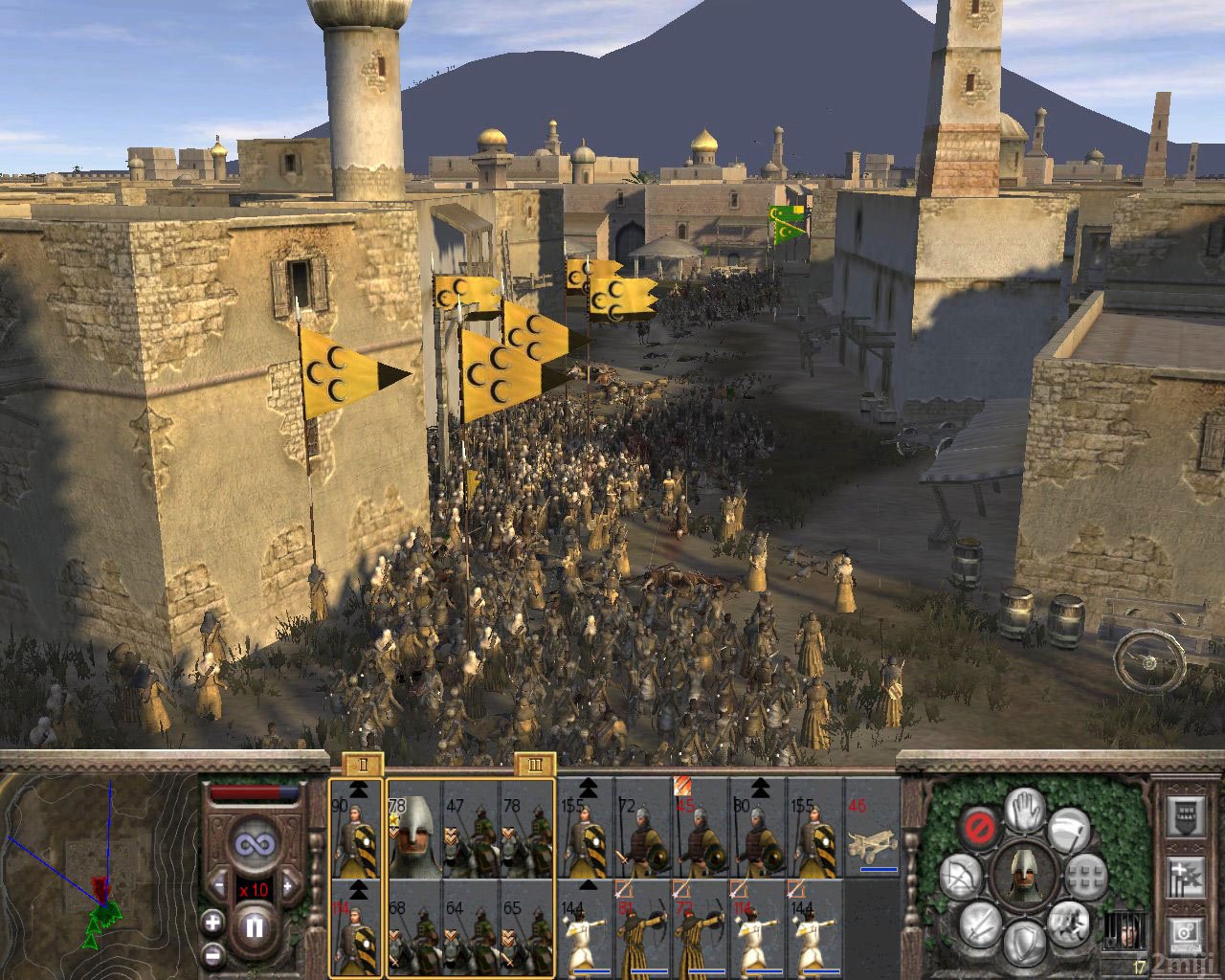
Hot search terms: 360 Security Guard Office365 360 browser WPS Office iQiyi Huawei Cloud Market Tencent Cloud Store

Hot search terms: 360 Security Guard Office365 360 browser WPS Office iQiyi Huawei Cloud Market Tencent Cloud Store
There are many novices who don’t know how to develop the economy in Medieval 2: Total War, so the editor has brought the development strategy of the economy in Medieval 2: Total War. Friends who are interested can learn about it with the editor.
1. Urban management.
To put it bluntly, it is taxation. Taxation is used for national construction and military maintenance. Needless to say, an important point that is often overlooked is that taxation is related to population growth. Population growth is related to public health and order. Only a harmonious society can develop stably. Taxation must be used to control population. To maintain stability, every city must have a governor because only the governor can adjust taxes. At the beginning, each city must be adjusted to extremely high taxes (under the premise of maintaining a green smiley face). If the city needs to expand, the tax will be lowered, and when the population reaches expansion, it will be adjusted back to extremely high. A very important point: if you want to increase the urban population, do not upgrade crops, because that is irreversible. In the future, the population growth will exceed the urban expansion and it will be uncontrollable. This will be discussed later. The virtues and skills of the governor will affect taxation. The higher the virtue, the more suitable for being a city governor. The higher the cruelty, the better for fighting. The skills of night warriors and excellent siege generals are suitable for siege. (A reminder: always pay attention to the age of the governor. After the governor dies of old age, the city will no longer be managed. , generally the governor’s son will grow up when he is around 45-60 years old)

2. City and castle selection.
The selection of cities and castles is very important. It cannot be said that the more money the city has, the more money it will have. That is not the case. The city needs to be managed by a governor. When there are not enough governors, don’t build too many cities, and don’t expand the territory. Some cities without governors had even lower incomes than castles, were densely populated, had poor public health, and were prone to riots. The advantage of a low castle is that it has good discipline, stable income, does not require the supervision of a governor, requires fewer troops for security, ensures the safety of nearby cities, and provides elite troops. To put it bluntly, it means less headaches. Castles are the guarantee for national expansion. Don't build cities blindly. Be down-to-earth and take your time. If the country is stable and the economy is good, there will be many cities in the future. It is recommended to keep the default castle. Don't casually rebuild the castle into a city. First, the castle is a strategic point for national defense, and second, because the castle generally has a high level of farmland and cannot control the population after rebuilding the city, making it difficult to play.
3. Military pay.
Many people build troops blindly, and the more they play, the poorer they get. Each round charges an army maintenance fee. You have to keep a balance between income and military pay and have a certain amount of money left over to keep building houses. Every city needs an army to maintain its rule. The city must use troops that are free of military maintenance fees, otherwise it will be bankrupt. A city has a certain number of troops that are free of military maintenance fees according to the level of the city wall. (Right-click on the wall to view) It is important to make good use of this point. Generally, cities with "Health" and "Normal Population" can use this number of troops to maintain a green face under extremely high taxes without causing riots. However, the newly occupied city has to wait until the public security is stable before it can use troops exempted from military maintenance costs. The city has a large population. One thing to note: the troops exempted from military pay can only be soldiers built in the city and they are specific types of arms, such as spear infantry and spear militia. A castle with normal security requires two to four units of soldiers to maintain depending on the castle level. (There is a fee, so don't defend the castle too much). The remaining troops are used for national defense expansion. You can explore the balance between military pay and finance according to the situation.

4. Construction.
再强调一点保持社会和谐安定(绿脸笑脸)是最重要的,和谐社会经济才能平稳发展。 Factors that destroy harmony are religious unrest, cultural clashes, riots, destruction, corruption, disease-dirt. The Middle Ages was an era of religious rule. If you want the people to behave, you must first control their thoughts. Be the first to build churches and create more priests to resolve religious turmoil and cultural conflicts. It is easier for priests with high levels to become popes and launch crusades for expansion. second barracks The third parliament solves riots and destruction, increases public health, and solves corruption. The fourth hotel (restaurant) solves riots and destruction. Can recruit assassins and spies, and then build markets, commercial docks, etc. The order can be changed according to the situation, but harmony must always come before the economy. In fact, if you rush to build the economy first, there won't be much change because the economy, population, and public security are in charge.

Farmland upgrade issues that must be mentioned: Many people think that farmland can significantly increase economic income and promote population growth, so they have increased farmland. This is very wrong. Yes, farmland can promote population growth and increase population growth. However, the population growth driven by economic growth and the population growth driven by food are too powerful. What will happen later will follow. It takes more and more turns to upgrade buildings. If the population growth rate exceeds the city construction speed, it will be uncontrollable. All kinds of riots and filth will require a lot of troops and military pay to maintain it. So we only need to upgrade one level at the lowest level (city). To be precise, upgrading requires two turns of farmland. (Lest some people come to criticize me after I upgrade to three levels as soon as I get started), and the castle’s population growth is low and its economy is low, so it is necessary to upgrade the farmland at every level.
Configuration requirements
Operating system: Microsoft Windows 2000/XP
CPU: Intel Celeron 1.7GHz Pentium 4 or equivalent AMD processor
Memory: 512M
Hard disk: 13GB or more space
Sound card: 16-bit sound card product fully compatible with DirectX 9.0c
Game peripherals: keyboard and mouse fully compatible with Windows 2000/XP operating system
DirectX version: DirectX 9.0c
Graphics card: Nvidia GeForce 4 Ti equipped with 128MB of video memory, supporting Shader 1.0 technology and fully compatible with DirectX 9.0c technology 4400 or ATI Radeon 9800 graphics card
The above is the entire content of how the economy develops in Medieval 2: Total War. Interested friends, please come and watch!
 How to register for the international version of Minecraft? -How to register for the international version of Minecraft
How to register for the international version of Minecraft? -How to register for the international version of Minecraft
 How to install light and shadow in the international version of Minecraft? -How to install light and shadow in the international version of Minecraft
How to install light and shadow in the international version of Minecraft? -How to install light and shadow in the international version of Minecraft
 How to create a LAN room in the international version of Minecraft? -How to create a LAN room in the international version of Minecraft
How to create a LAN room in the international version of Minecraft? -How to create a LAN room in the international version of Minecraft
 How to adjust the crosshair in the international version of Minecraft? -How to adjust the crosshair in the international version of Minecraft
How to adjust the crosshair in the international version of Minecraft? -How to adjust the crosshair in the international version of Minecraft
 How to switch to spectator mode in the international version of Minecraft? -How to switch to spectator mode in the international version of Minecraft
How to switch to spectator mode in the international version of Minecraft? -How to switch to spectator mode in the international version of Minecraft
 Sohu video player
Sohu video player
 WPS Office
WPS Office
 Tencent Video
Tencent Video
 Lightning simulator
Lightning simulator
 MuMu emulator
MuMu emulator
 iQiyi
iQiyi
 Eggman Party
Eggman Party
 WPS Office 2023
WPS Office 2023
 Minecraft PCL2 Launcher
Minecraft PCL2 Launcher
 How to transform into a Titan in Attack on Titan? -How to supply supplies in Attack on Titan game?
How to transform into a Titan in Attack on Titan? -How to supply supplies in Attack on Titan game?
 Which character is good in Genshin Impact? -Recommended guide for Genshin Impact characters
Which character is good in Genshin Impact? -Recommended guide for Genshin Impact characters
 How does Red Alert quickly select the third level of troops? -How does Red Alert make soldiers squat and attack?
How does Red Alert quickly select the third level of troops? -How does Red Alert make soldiers squat and attack?
 How does Ni Shuihan combo attacks with one click? -How does Nishuihan use coordinates to find paths?
How does Ni Shuihan combo attacks with one click? -How does Nishuihan use coordinates to find paths?
 How to operate Forza Horizon 4 - How to operate Forza Horizon 4
How to operate Forza Horizon 4 - How to operate Forza Horizon 4